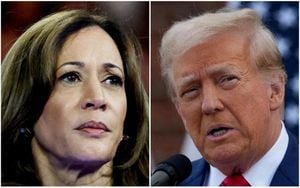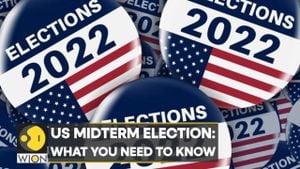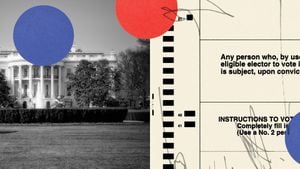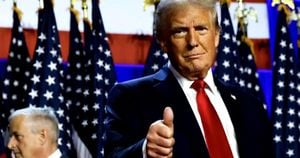International Reactions to Trump's Shocking Election Victory
Donald Trump’s recent victory in the U.S. presidential election is sending ripples through international politics. Among those affected, nations like China and Russia are displaying contrasting responses, each braced for the potential upheaval Trump’s second term could bring.
Just hours after the news broke, Russia's response was quick and telling. Dmitry Medvedev, the former president and now deputy chairman of Russia’s Security Council, underscored Moscow’s views of Trump as someone who might change the course of the war with Ukraine. He hinted at Trump’s anti-globalist sentiments, remarking, "But Trump has one quality useful for us - as a core businessman, he detests spending money on...idiotic allies, stupid charity projects and voracious international organizations." His acknowledgment of Trump's potential to scale back U.S. involvement overseas raises eyebrows, especially concerning the continuing conflict with Ukraine.
Over at the Chinese diplomatic front, the official line seems to tread cautiously. China's foreign ministry spokesperson Mao Ning stated, "Our policy toward the U.S. remains consistent." This suggests Beijing's intent to manage relations based on mutual respect, peaceful coexistence, and win-win cooperation. Yet, strategists within China recognize the shadow of trade conflicts looming over this outlook. Analysts fear Trump’s return to power might escalate trade tensions even higher than they were during his first term. Stallions of fear have arisen over Trump's past suggestions of imposing tariffs exceeding 60% on Chinese imports, creating apprehension about how this could impact China's already struggling economy.
Trump's rhetoric during his campaign didn't leave room for ambiguity either. He made bold claims about manufacturing tariffs and expressed his willingness to penalize China should it interfere with Taiwan. Chinese economic experts have projected severe consequences – potentially diminishing their GDP growth if such tariffs were enacted. Zhu Baoliang, former chief economist at China’s economic planning agency, pointed out, "If Trump raises tariffs to 60%, this could slice $200 billion off China's exports, resulting in around 1% decrease of GDP growth."
While China’s audience is brimming with cautious optimism, contemplation of the effects remains at the forefront of national discourse. Comments on Chinese social media reflect anxiety as many ponder how Trump's policies will affect their daily lives. One user noted, "It’s hard to view Trump’s victory with joy, knowing there will be economic pressures from trade wars." This sentiment is echoed by others who question how significantly their lives will change, cringing at the potential consequences of heightened tariffs.
On the opposite end of the spectrum, Taiwanese citizens are expressing overt optimism and cautious anticipation surrounding Trump's ascendance. Taiwan's President William Lai congratulated Trump, expressing confidence in the U.S.-Taiwan partnership and predicting it as pivotal for regional stability. This affectionate connection with Trump signals hope for Taiwan, seen as its potential ally against the growing pressures from Beijing. Still, the unease tied to the unpredictability of Trump’s policies lingers. With potential tariffs and increased military readiness looming, Taiwan grooms for repeated assertiveness from Beijing.
Despite the budding uncertainty, some observers note the possibility for constructive dialogue to emerge. Brian Wong, professor of grand strategy at the University of Hong Kong, suggested, "Going forward, Beijing will likely be drawing up clear bargains and trade-offs, hoping to focus on domestic needs as Trump’s administration pursues other interests." From this perspective, it’s plausible to think Trump’s transactional, isolationist style may inadvertently create new opportunities for strategic negotiation.
Back to the financial world, stock markets took disparate paths following the election results. While U.S. stocks surged to all-time highs, concerns abounded for Chinese markets. Analysts predict increased stimulus measures may arise as China tries to adapt to the unpredictable economic game Trump could bring. A snowball effect of market responses augmented pressures on China’s already challenged economy.
Observers recognize Trump may reactivate his "Deal-Making" tendencies, pushing for negotiations, which could hang heavily on Taiwan's fates. Some economists, like Jacob Gunter, have voiced potential resolutions through aggressive negotiations. Should tariffs be levied, Gunter posits, it may lead to renewed bargaining efforts between China and the U.S., contingent on how Trump navigates these treacherous waters.
Adding to the complexity, reactions from other global leaders are also being closely monitored. Japan, adjusting to this new political climate, has been taking stock of strategical alignments with both China and the U.S. Given Trump’s tendency to act unpredictably, many nations are preparing for potential shocks and anticipating ramifications across global trade networks.
Over time, as nations react and adapt to Trump’s foreign policy approach, it is clear the global political arena stands teetering at the crossroads. While allies rally around expectations of strong partnerships, adversaries gear up for potential confrontations. Observers around the world remain on alert, recognizing the delicate web of international relations now entwined with Trump’s decisive win.
Uncertain but tenacious, the international stage braces itself for what’s already shaping up to be tumultuous relations as Trump's presidency takes form. With powerful players wary of each move, the upcoming U.S. administration is likely to trigger shifts on multiple fronts, pushing nations to not only react but also adapt to the emergent geopolitical dynamics.
Trump's presidency, with all its nuances, will undoubtedly spur changes across various dimensions of diplomacy, economics, and military strategy globally. The world watches as the upcoming months draw nearer, eager to understand how Trump's second term will mold the international fabric once again.



